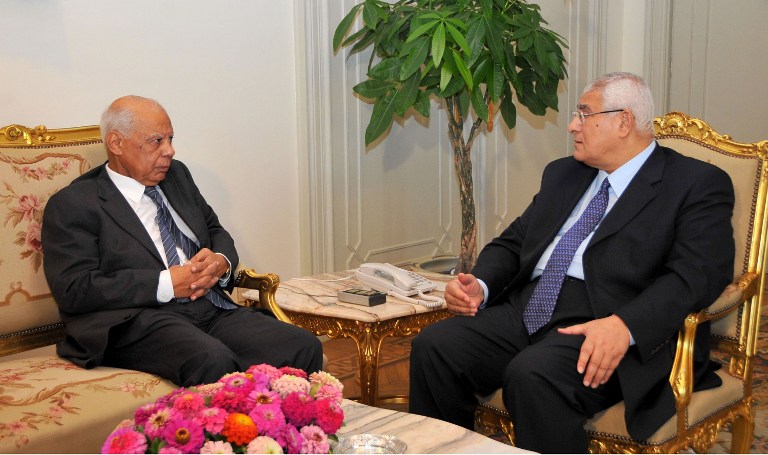SUMMARY
This is AI generated summarization, which may have errors. For context, always refer to the full article.

CAIRO, Egypt – Egypt’s main coalition, which backed the military ouster of Mohamed Morsi, denounced on Tuesday, July 9, a roadmap granting the interim president extensive powers ahead of new elections, further complicating a bloody transition to civilian rule.
In the restive Sinai peninsula, two people were killed early Wednesday, July 10, when militants struck several police and army positions with mortar rounds and rocket propelled grenades.
The fresh violence came less than a day after interim President Adly Mansour laid out a timetable for elections by early next year and appointed a new prime minister and vice president.
The vice president, Nobel peace laureate Mohamed ElBaradei, was one of Morsi’s most ardent opponents.
The National Salvation Front (NSF), the main coalition that called for Morsi’s resignation, announced “its rejection of the constitutional decree,” in a statement.
The coalition, which was led by ElBaradei before Morsi’s overthrow, will seek amendments to the decree, it added, without specifying the offending clauses.
Morsi’s Muslim Brotherhood, which insists on the ousted president’s reinstatement, has also rejected the interim charter and timetable.
Meanwhile, new premier Hazem al-Beblawi is planning to extend an olive branch to the Muslim Brotherhood by offering them cabinet posts, the official MENA news agency quoted a presidential aide as saying.
The conciliatory move will likely be rejected by the Brotherhood.
Continued violence
The military’s ouster of president Morsi a week ago, after massive protests calling for his resignation, has pushed the divided country into a vortex of violence that has already claimed dozens of lives.
In the worst violence since Morsi’s overthrow, at least 51 people, most of them supporters of the ousted Islamist, died in clashes outside military barracks in Cairo on Monday, July 8.
An official with one of the parties in the NSF told AFP that Mansour’s 33-article declaration foresees new “legislative, executive and judicial powers” for the interim president.
“You would look like a hypocrite now. It makes it look as if you are not against dictatorship, just against a dictatorship that is not from your group,” he said.
The official requested anonymity as his party prepared its own statement, amid apparent fissures in the loose coalition.
In the Sinai attacks overnight, militants struck a police garrison with mortar rounds and heavy machine guns, security officials said.
Elsewhere, two people were killed in a rocket propelled grenade attack on a checkpoint manned by soldiers and police, medics said.
The Muslim Brotherhood has called for an “uprising” to restore Morsi, Egypt’s first democratically elected president, as the legitimate president.
On the opposing end, Tamarod, the movement that spearheaded the grassroots campaign against Morsi, complained that it had not been consulted on the transition plan announced by Mansour and would also make proposals for changes to the blueprint.
But the army warned it would brook no disruption to what it acknowledged would be a “difficult” transition.
The blueprint unveiled by caretaker president Mansour is intended to replace the controversial Islamist-drafted constitution, suspended on Morsi’s ouster.
A committee will be set up to make final improvements to the draft before it is put to a referendum.
Parliamentary elections will then follow within three months and Mansour will announce a date for a presidential election once the new parliament has convened.
International pressure
The United States, which provides $1.5 billion in mainly military aid to Egypt, said it was “cautiously encouraged” by the timetable proposed for a new presidential election.
The Egyptian military has come under huge international pressure to swiftly install an interim civilian administration, pressure that has only intensified since Monday’s carnage.
A military statement read out on state television on Tuesday said neither the armed forces nor the people of Egypt would accept “the stalling or disruption” of this “difficult and complex” period.
The Muslim Brotherhood held fresh protests on Tuesday against both Morsi’s ouster and Monday’s fatal shootings outside the Cairo headquarter of the elite Republican Guard.
Mansour has ordered an independent inquiry into the bloodshed, which sparked expressions of concern and condemnation from around the world.
Emotions ran high as people searched for the names of missing loved ones on a list of the dead in hospital, where dozens of bodies were laid on the bloody floor of a makeshift mortuary.
International condemnation of the bloodshed poured in, with Germany expressing “shock” at the violence and Turkey calling it an attack on “humanity”.
The United States called on the Egyptian army to exercise “maximum restraint”, while also condemning “explicit” Brotherhood calls to violence.
Morsi’s single year of turbulent rule was marked by accusations he failed the 2011 revolution that ousted autocratic president Hosni Mubarak by concentrating power in Islamist hands and letting the economy nosedive.
In a boost for the economy, Saudi Arabia and the United Arab Emirates announced on Tuesday that they would give Egypt $8 billion in assistance. – Rappler.com
Add a comment
How does this make you feel?
There are no comments yet. Add your comment to start the conversation.